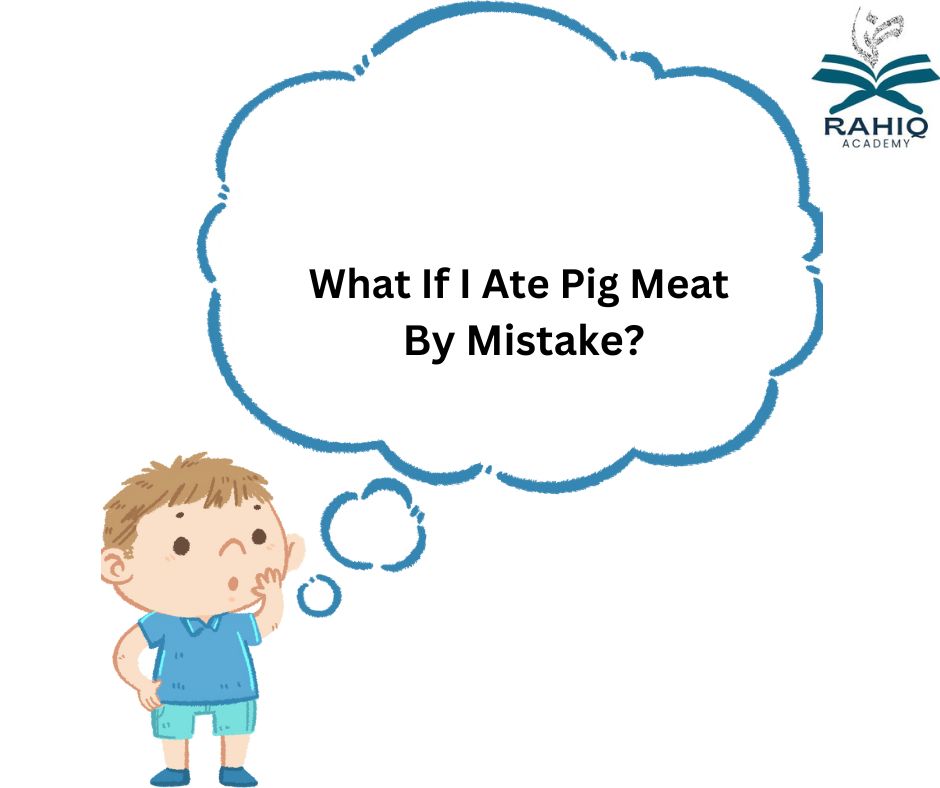Islamic dietary laws are an essential aspect of the Muslim way of life, guiding not just physical health but also spiritual purity.
These laws are derived from divine directives found primarily in the Quran and Hadith, which outline permissible (Halal) and forbidden (Haram) foods.
Among the various dietary restrictions, the prohibition of pork is perhaps the most well-known globally, irrespective of religious and cultural backgrounds.
This article answer an important question What Happens if a Muslim Eats Pork? explores the prohibition’s religious, spiritual, and practical dimensions, aiming to provide both Muslims and non-Muslims with a clear understanding of its significance.
Understanding Prohibition
For Understanding Prohibition The Quran explicitly forbids the consumption of pork in several verses, such as:
إِنَّمَا حَرَّمَ عَلَيْكُمُ الْمَيْتَةَ وَالدَّمَ وَلَحْمَ الْخِنزِيرِ وَمَا أُهِلَّ بِهِ لِغَيْرِ اللَّهِ فَمَنِ اضْطُرَّ غَيْرَ بَاغٍ وَلَا عَادٍ فَلَا إِثْمَ عَلَيْهِ إِنَّ اللَّهَ غَفُورٌ رَّحِيمٌ
“He has only forbidden to you dead animals, blood, the flesh of swine, and that which has been dedicated to other than Allah. But whoever is forced [by necessity], neither desiring [it] nor transgressing [its limit], there is no sin upon him. Indeed, Allah is Forgiving and Merciful.” (2:173)
قُلْ لَّا أَجِدُ فِي مَا أُوحِيَ إِلَيَّ مُحَرَّمًا عَلَىٰ طَاعِمٍ يَطْعَمُهُ إِلَّا أَن يَكُونَ مَيْتَةً أَوْ دَمًا مَّسْفُوحًا أَوْ لَحْمَ خِنزِيرٍ فَإِنَّهُ رِجْسٌ أَوْ فِسْقًا أُهِلَّ لِغَيْرِ اللَّهِ بِهِ ۖ فَمَنِ اضْطُرَّ غَيْرَ بَاغٍ وَلَا عَادٍ فَإِنَّ رَبَّكَ غَفُورٌ رَّحِيمٌ
“Say, ‘I do not find within that which was revealed to me [anything] forbidden to one who would eat it except it be a dead animal or blood spilled out or the flesh of swine – for indeed, it is impure – or an impiety dedicated to other than Allah.’ But whoever is forced [by necessity], neither transgressing [inwardly] nor oppressing [others], then indeed, your Lord is Forgiving and Merciful.” (6:145)
حُرِّمَتْ عَلَيْكُمُ الْمَيْتَةُ وَالدَّمُ وَلَحْمُ الْخِنزِيرِ وَمَا أُهِلَّ لِغَيْرِ اللَّهِ بِهِ ۖ وَالْمُنْخَنِقَةُ وَالْمَوْقُوذَةُ وَالْمُتَرَدِّيَةُ وَالنَّطِيحَةُ وَمَا أَكَلَ السَّبُعُ إِلَّا مَا ذَكَّيْتُمْ ۖ وَمَا ذُبِحَ عَلَى النُّصُبِ وَأَن تَسْتَقْسِمُوا بِالْأَزْلَامِ ۚ ذَٰلِكُمْ فِسْقٌ ۚ
“Prohibited to you are dead animals, blood, the flesh of swine, and that which has been dedicated to other than Allah, and [those animals] killed by strangling or by a violent blow or by a head-long fall or by the goring of horns, and those from which a wild animal has eaten, except what you [are able to] slaughter [before its death], and those which are sacrificed on stone altars, and [prohibited is] that you seek decision through divining arrows. That is grave disobedience.” (5:3)
The Prophet Muhammad (peace be upon him) also emphasized the prohibition of pork in numerous Hadiths, including:
And the hadiths in Arabic with English translation, hadith number and source:
- صحيح مسلم، كتاب الصيد، حديث رقم 1933:
إِنَّ اللَّهَ وَرَسُولَهُ حَرَّمَا بَيْعَ الْخَمْرِ وَالْمَيْتَةِ وَالْخِنْزِيرِ وَالْأَصْنَامِ
“Verily, Allah and His Messenger have prohibited the sale of alcoholic drinks, dead animals, pork, and idols.” (Sahih Muslim)
- صحيح مسلم، كتاب الأشربة، حديث رقم 1936:
إِنَّ اللَّهَ إِذَا حَرَّمَ شَيْئًا حَرَّمَ ثَمَنَهُ
“When Allah prohibits a thing, He prohibits (giving and taking) its price/value.” (Sahih Muslim)
This prohibition is repeated and emphasized, highlighting its importance. The prohibition extends beyond mere dietary guidance, serving as a command for maintaining bodily and spiritual purity.
Rationale Behind the Prohibition
Rationale Behind the Prohibition of pork in Islam include theological, ethical, and health perspectives. Theologically, obeying this prohibition is a submission to Allah’s will, an act of worship that underscores a Muslim’s devotion.
Ethically
It represents a commitment to cleanliness and purity, traits highly valued in Islam.
From a health perspective
scholars have pointed to various scientific studies that outline the health risks associated with pork, such as
- trichinosis
- higher cholesterol levels
- an increased risk of certain types of cancer and heart disease.
Consequences of Consuming Pork
Consuming pork knowingly and without coercion is considered a major sin in Islam. This section explores the Consequences of Consuming Pork the spiritual implications of intentionally consuming pork, the concept of sin, and its impact on a Muslim’s spiritual and communal life. It also addresses the importance of repentance and how Muslims can seek forgiveness for sins through sincere repentance and returning to the path of compliance with Islamic dietary laws.
Practical Implications
Living in societies where pork is commonly consumed presents unique challenges for Muslims. This section provides Practical Implications on avoiding pork, such as
- learning to read food labels carefully
- asking about ingredients in prepared foods
- and supporting halal food businesses
- It also discusses the role of community and family support in helping adhere to dietary restrictions, especially in non-Muslim countries.
Fulfilling Our Purpose Through Obedience
This section delves deeper into how obedience to dietary laws fits into the broader Islamic perspective on life’s purpose. Adherence to these laws is seen as part of a comprehensive approach to living a life that is pleasing to Allah, encompassing all aspects of one’s behavior, ethics, and personal interactions.
What If I Ate Pig Meat By Mistake?

Islam emphasizes intention in all acts of worship and daily life, recognizing that mistakes and oversights can happen. The unintentional consumption of pork is treated with understanding and mercy under Islamic law. The primary principle here is that there is no sin on someone who does something unintentionally, as reflected in several Hadiths and Quranic verses.
According to the teachings of Islam, when a Muslim consumes pork unknowingly or accidentally, they are not held accountable for this action.
The Prophet Muhammad (peace be upon him) stated that Allah has forgiven his nation for mistakes, what they forget, and what they are forced into doing. Thus, if a person consumes pork without knowing it was pork or under the impression that it was permissible, they are not sinning. The crucial factor here is knowledge and intention; sin involves awareness and deliberate action.
If a Muslim accidentally consumes pork
- spit out the food immediately upon realization
- rinse their mouth
- continue with their life without feeling guilt
The act of consuming pork unintentionally does not require any specific form of atonement or expiation
the individual is simply advised to be more cautious in the future. It’s an opportunity for Muslims to learn more about the importance of checking the content of what they eat and to reinforce the habit of seeking halal options.
For further details on how to handle accidental consumption of pork and other dietary accidents in Islam, you can visit IslamQA.
This understanding not only shows the compassion and realism of Islamic law but also underscores the importance of intention in the accountability of actions in Islam. This principle ensures that Muslims strive for mindfulness and intentionality in all aspects of their lives, including adhering to dietary laws.
What is The Punishment For Eating Pork in Islam?
Whoever eats pork meat intentionally, without compulsion, fully aware of its prohibition and not ignorant, and believes in its prohibition, is considered a sinful and disobedient Muslim who must repent to Allah the Almighty.
Pork meat is forbidden, as Allah states in the Quran (Al-Ma’idah: 3).
The Prophet Muhammad ﷺ “also affirmed this prohibition, mentioning specifically that Allah forbade alcohol, carrion, and pork and their prices” as narrated by Abu Dawood.
If a person takes it without knowing, then there is no sin on him for that, as evidenced by the Almighty’s saying: “There is no blame upon you for that in which you have erred but [only] for what your hearts intended. And ever is Allah Forgiving and Merciful.” (Al-Ahzab: 5)
Islamic teachings emphasize that eating pork knowingly is a sin requiring sincere repentance but does not prescribe a worldly legal punishment. The focus is on spiritual accountability and repentance, and Allah’s mercy is vast for those who turn back in sincere remorse.
Conclusion
The prohibition of pork is deeply embedded in Islamic dietary law, reflecting broader themes of obedience, purity, and community well-being. By understanding and observing this prohibition, Muslims affirm their commitment to a divinely guided way of life that promotes spiritual health and ethical living.
Want to take your Arabic and Quranic studies to the next level?
Explore our comprehensive Online Courses designed for all skill sets!
Visit our Website to learn more, book Your Free Evaluation and enroll today.
FAQs

Q: Why is pork forbidden in Islam?
A: Pork is forbidden in Islam primarily due to divine directives found in the Quran, such as Surah 2:173, 6:145, and 5:3
which categorize pork as impure and harmful, and thus unfit for consumption. The Prophet Muhammad (peace be upon him) also emphasized this prohibition in several Hadiths, including narrations from Sahih Muslim. The prohibition is meant to preserve both physical health and spiritual purity.
Q: What should I do if I accidentally eat pork?
A: If a Muslim accidentally consumes pork, they are not held accountable for the action, as intention plays a crucial role in the assessment of sins in Islam. It is recommended to immediately cease eating it once the realization occurs, rinse the mouth, and continue life without guilt. No specific atonement is required, but increased caution in the future is advised.
Q: Can consuming pork accidentally affect my prayers and fasting?
A: Accidentally consuming pork does not invalidate prayers or fasting because there was no intention to break these practices. Islamic teachings emphasize mercy and understanding, recognizing that humans can make mistakes. The key is to ensure that the action was genuinely unintentional.
Q: Is it a sin to eat pork if I didn’t know it was pork?
A: Consuming pork without the knowledge that it is pork is not considered a sin in Islam. The sin involves awareness and deliberate violation of the prohibition. When the act is done unknowingly, it falls under the mercy and forgiveness that Islam extends to unintentional actions.
Q: How can I ensure that I do not accidentally consume pork?
A: To avoid accidentally consuming pork, always check food labels and inquire about the ingredients in meals, especially when dining out or purchasing processed foods. Opting for halal-certified products and eateries is a safer way to adhere to dietary laws.




